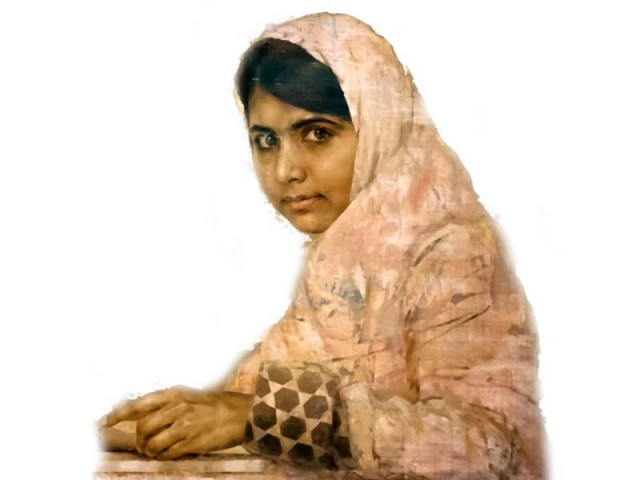2013 Peace Prize: No Nobel – but three cheers for Malala
Little known chemical arms watchdog walks off with top award.

Portrait by Jonathan Yeo at the National Portrait Gallery in central London. Part of the “Jonathan Yeo Portraits” exhibition, running until January 2014. PHOTO: AFP
In the end, Malala Yousafzai’s own words proved prophetic. “I have not done that much to win the Nobel Peace Prize,” she had said 48 hours before the prize was announced.
She did not win – much to people’s disappointment – even though she was named a ‘favourite’ and was declared a front-runner candidate for the coveted award.
As everyone waited at 2PST for the award to be announced, the news of the UN-backed Organisation for Prevention of Chemical Weapons (OPCW) winning the prize was leaked a few minutes before in the foreign media.
The news came as a shock for most people as no one had anticipated an OPCW win – the little-known organisation was not even named in the top possible winners. Yet the chemical weapons’ watchdog picked up the award for “its extensive efforts to eliminate chemical weapons”.
While The Guardian mocked the Nobel committee’s decision, it congratulated Malala for failing to win the Nobel parody prize. Noting that Mahatma Gandhi had never won the award – despite being nominated several times – the newspaper said “perhaps the committee’s admiration for Malala was tempered by fretting that giving her the prize could see non-peaceful protests in Pakistan”.

According to a press release issued by the Norwegian Nobel Committee, “The conventions and the work of the OPCW have defined the use of chemical weapons as a taboo under international law.”
“The Norwegian Nobel Committee has through numerous prizes underlined the need to do away with nuclear weapons. By means of the present award to the OPCW, the Committee is seeking to contribute to the elimination of chemical weapons,” the Norwegian jury explained its decision. The jury directly criticised the United States and Russia for failing to destroy their chemical weapons by April 2012, as required by the Chemical Weapons Convention.
“Certain states have not observed the deadline,” the jury said. “This applies especially to the US and Russia.”
This marks the second consecutive year an organisation has won the prestigious award. Last year’s award went to the European Union.
In a statement through the public relations firm representing her, Malala congratulated the OPCW and thanked those who had pressed for her to win. “The OPCW is an important organisation working on the ground to help rid the world of chemical weapons,” she said. “I will continue to fight for the education for every child, and I hope people will continue to support me in my cause.”
Malala was hotly tipped to win the Nobel after courageously fighting back from a Taliban attempt on her life to lead a high-profile international campaign for the right of all children to go to school. Although she missed out on the award, she has become a formidable -- and instantly recognisable -- force for rights.
She received a standing ovation for an address to the United Nations General Assembly in July in which she vowed she would never be silenced. On Thursday, she won the European Union’s prestigious Sakharov human rights prize.
This week, in the run-up to the first anniversary of the shooting and the Nobel announcement, the global media spotlight has been firmly focused on Malala.
During her interview with CNN’s Christiane Amanpour, she said, “If I get the Nobel Peace Prize, I think it will be such a great honour, more than I deserve, and such a great responsibility as well.” The show at a New York City cultural centre was sold out.
The 16-year-old has also published an autobiography and been invited to tea with Queen Elizabeth II, achieving an extremely high level of fame in a short period of time.
But sceptics do exist and loudly criticise her shooting to ‘stardom’. Some went so far as to term the entire incident of the Taliban shooting her a farce. Many ask whether she was even shot in the first place. Many social media groups have run anti-Malala campaigns.
Some are suspicious of her father, calling him overambitious. “Most people think this attack on Malala was a fake and a staged drama,” said Ibrar Khan, a political science student in Mingora. “Her father used this incident to go abroad and get an attractive job.”
Nonetheless, Malala has risen above all negativity and suspicion and is now the global voice for girl’s education, a universal symbol of survival and hope, as well as an upcoming political and social force.
Published in The Express Tribune, October 12th, 2013.



















COMMENTS
Comments are moderated and generally will be posted if they are on-topic and not abusive.
For more information, please see our Comments FAQ